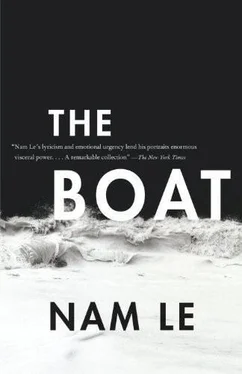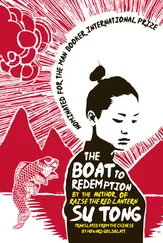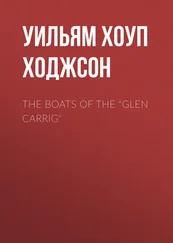She shushes me and waves me away, then, as the commercials come on, she half turns and says, Do you think I should dye my hair more blonde?
Why do you want to, dear Mother?
I don't know, she says. Maybe it will make me look younger.
Younger? You already look young. In the streets, people do not think you are my mother. They think you are my sister. My mother has heard this before but still her face beams. I continue: They say, Is she your sister? And I say, Are you joking?
Tonto ! she cries out. I go into the kitchen to get some panela from the large urn. You should learn from your friend Xavier, she calls out.
Xavier?
I feel a tightening in my stomach, like the tightening when you walk into a room with your weapon ready and the target is not there. Then I think, I am stupid to feel surprised.
He has nice manners on the phone. Who is this friend? He said you are lucky to have a mother such as me.
He said that.
I add milk to the panela and bring it out to her with some Saltina biscuits.
We need more candles, she says absently. They say there will be another blackout tonight.
What else did Xavier say? I ask, putting the tray down, but the commercials have ended and my mother is once again lost to her soap show.
I pick up the notepaper next to the phone. She has written down an address in her large, girlish writing. It means nothing to me. For a moment I consider telling her to turn off the TV and start packing once more, but already, I know, it is too late. My only hope is to meet with him tonight. I put the paper in my jacket, my heart beating pâ pâ pâ from what I have just heard, and bend over the chair to kiss my mother's forehead.
Outside, I catch a bus to Aures. Claudia's house is the old cement one painted blue, halfway up the hill.
She turns from the large window when I arrive and says, Buenas noches, guapo . I am calmer now. The night air has cooled me. Claudia comes and lifts her hand to almost touch my face, then lets it drop. She knows I do not like to be touched around the head.
Let's go to the park, she says, like a question.
I nod. I am watching her. The window gap behind her is bigger than her whole body, and the dark openness is somehow beautiful; it is rare that any window in this city is not nailed up with grilles or latticework. Behind the window is a sheer drop of twenty meters into a marsh of mud and rocks and rubbish.
We walk up the hill together. The night air is cold and clean. All this time I am thinking about Claudia's window, and how it used to be filled with glass until one day her mother came home from the market, pulled the glass pane so far back the wrong way the hinges broke, climbed up onto the ledge and stood upright before throwing herself out. Even then, she only managed to ruin the right half of her body.
We arrive at the spot. It is dark. Ever since I showed it to Claudia she thinks of it as our spot, but in fact I prefer to go there without her. It is high, above the barrio, past the reach of the electricity cables, at the top of the hill where there are fields of yellow ichu grass and you can feel the wind from all four directions. Recently I have come here every day to sit in the long grass and sometimes drink or do the basuco . From this place I see the deep, narrow, long valley where the city of Medellin lies, cradled by mountains. The tall buildings rising out of the middle. I see the nameless streets, carreras running one way and callés the other. And in the evening I see the streetlights come on, running in gridded patterns until they reach the mountainsides where they race up and spread out until all the barrios that surround the city shimmer like constellations.
It is like that tonight, everything upside down. The stars are under us and above, a sky like dirt.
So you are really going to Cartagena? Claudia says.
Yes.
Why?
Why? To myself I think, To see the ocean. But I say, What did you want to talk to me about? I have important business tonight.
What business?
There is no reason not to tell her. I say, I am meeting with my agent.
So it is real, she says. You have been summoned.
I am silent. Everywhere around us is the whine of grasshoppers, and farther away the noise of people and machines sounds to me like the wash of the ocean. From far enough away everything sounds like the ocean.
There is a night bus to Tolii from the Terminal del Norte, says Claudia.
I shake my head.
I know about Hernando, she says. Everybody does.
What do you know?
She opens her mouth as if to speak, then stops. Then she says, The contract placed on him. By your agent.
You do not know everything, I say.
I watch Claudia's face carefully and it is hard, the face of a soldado with its thin cigarette mouth.
I must ask my agent for leave, I explain. Or he will find my mother.
Claudia pauses briefly. How is she?
My mother, I think, who I had assumed was safely hidden. She is glad I have been home, I say. Four whole days. I continue to watch Claudia. Excepting the business today, in the tigurio .
But she ignores me. Instead, she says, And you — how do you feel?
It is a question only a girl would ask.
Feel? I say.
She is right, though. Tonight, of all nights, I should feel something. If I think about it, then I am scared, yes, and sad, but it is as though that person who feels is someone other than me. In truth I sit here and I do not know what to feel. In truth I come up here to feel nothing.
The last time she asked me that was at Carlos's funeral, six months ago, at the Cemeterio Universal. It was the first death in our gallada. Everyone agreed he had died well. Then, too, I did not know what I felt standing before his grave. The hole was so small-he was never big, even though of us all he had the most hair on his legs and chest. My head was full of voices. One voice said, You should be crying, the other said, I want to, I want to, and behind both I could see myself, the fresh dirt on the mound, the bouquet of fake flowers, the statuettes of Marias and angels bobbing above the streets of headstones; I could hear the singing of birds and smell the plumeria and then feel the tears come, fake tears, watching my body and my hands so clearly as they moved, as through polished glass.
It is like that now; I am watching myself and it is like I am watching a different person.
You want to do some basuco ? Claudia asks, reaching into her bag.
I have to go, I say to her.
Then I will come with you, she says.
***
CHICAS , THEY ARE A DISTRACTION from the important things, and as Luis says, sometimes to go between the legs of a chica is more dangerous than walking under a bridge in a strange barrio. As for Claudia, we used to go together, as far as that goes. I am fond of her but in truth I would not call her a friend. There is only one I would call my friend, and that one is Hernando.
Hernando used to be the head of our gallada , if such could be said, although nobody would have admitted it. (Especially not Luis, who had the same age.) There were more of us then, perhaps twelve, and Hernando organized the mocds and arranged with restaurants and market sellers for food in return for protection. The children he sent cleaning windshields, shining shoes, juggling machetes, minding cars, making sales. The older ones he organized to steal cigarettes, flowers, and gum for the children to sell. Only a few of us did the serious robbery. We worked only for ourselves. After my father's death, my mother and I struggled for money and it was Hernando who helped us survive: he took me into the gallada and taught me all the techniques — how to run the tag team, when to wear the private-school uniform, how to spot marks, such as those gringos who go to ATMs with laundry bags and conceal their bills in dirty socks. I learned quickly, and soon Hernando chose me to work with him on all the big scores.
Читать дальше











